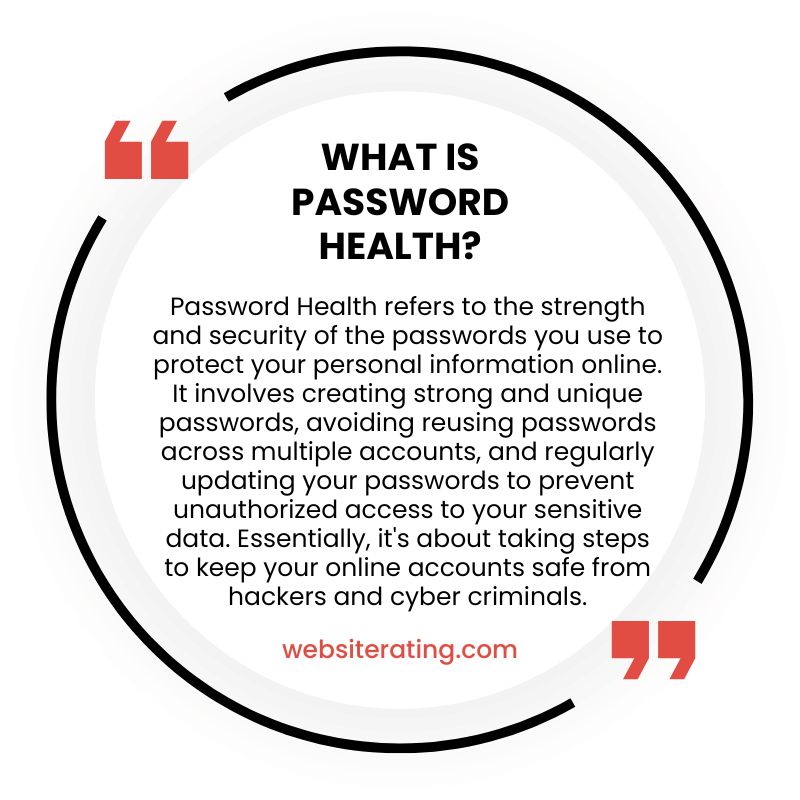The concept of password health is an important part of online security and the use of a password manager. Password health refers to the strength and complexity of a password, as well as how often it should be updated in order to keep accounts secure.

Good password health involves using complex passwords that are difficult for hackers or other malicious actors to guess. Additionally, it is important to regularly update passwords in order to further reduce the chances of unauthorized access.
Longer passwords that utilize a combination of letters, numbers, and symbols are more secure than shorter ones composed solely from words found in a dictionary. Changing passwords on a regular basis keeps them secure by ensuring that even if they have been compromised at some point in time they can no longer be used after their expiration date has passed.
This article will provide an overview of what constitutes good password health, the benefits associated with strong passwords, and some practical tips for maintaining good password health.
What is Password Health?
Understanding the importance of secure authentication is key to protecting sensitive information.
Password health refers to the overall security of a user’s passwords, as well as their ability to manage and remember them.
It encompasses not only the strength of each password but also the diversity of passwords used for different accounts.
A good password health strategy involves using strong passwords and never reusing any password across multiple sites or services.
This ensures that if one account is compromised, it doesn’t allow access to other accounts since all have unique credentials.
Additionally, a decent password manager can help users with setting up and managing complex passwords without having to memorize them all or write them down on paper where they could be stolen.
For example, a reliable manager like LastPass generates strong random passwords for every account and stores them securely in an encrypted vault, which can be accessed with just one master password – making managing multiple credentials easier and more secure than ever before.
Benefits of Good Password Health
Good habits with regards to passwords can have numerous positive effects, such as increased security and convenience. Good password health consists of creating strong passwords that are difficult for hackers to guess, changing them regularly or when suspicious activity occurs, and using a variety of different passwords for all accounts. Keeping track of these passwords in a secure manner is also important for maintaining good password health.
Having strong passwords that are changed periodically can help protect your personal information from cyber criminals and other malicious actors. Using different passwords across multiple accounts will also help keep your online identity secure. Using the same password across multiple sites increases the risk of having one account hacked or compromised which could then be used to access other accounts with the same login credentials.
Additionally, using two-factor authentication on sites where it is available will give you an extra layer of security by requiring an additional code or PIN each time you log in. By taking steps to ensure good password health, users can enjoy greater peace of mind knowing their data is secured against potential unauthorized access attempts.
Tips for Maintaining Password Health
Maintaining strong passwords and regularly changing them can help protect personal data from malicious actors. To maintain password health, users should:
- Avoid using the same or similar passwords for multiple accounts.
- Store their passwords securely in a password manager.
- Make sure to use two-factor authentication whenever possible.
Passwords should be between 8-14 characters long and include a combination of letters (both upper- and lowercase), numbers, and symbols. Additionally, they should not contain any easily guessed words such as names of family members or dates of birth.
The best way to ensure secure passwords is to use a password manager which can generate random passwords that are difficult to guess but easy to remember with the help of mnemonic phrases or other techniques. Password managers also allow for easy storage of passwords in an encrypted form so that users don’t have to worry about forgetting their login credentials.
Furthermore, by enabling two-factor authentication, users can add an extra layer of security by requiring both a username/password combination as well as another form of identification such as a one-time code sent via text message or email.
Summary
Good password health is a key factor in protecting online accounts from potential data breaches. While there are many techniques for creating and managing secure passwords, the most important practice is to always use strong, unique passwords that cannot be easily guessed or cracked by malicious actors. When used correctly, these can provide robust protection against unauthorized access.
Additionally, it’s equally important to regularly update and monitor passwords to ensure they remain secure. By taking the necessary measures to maintain password health, users can protect their personal information while also enjoying the convenience of using digital services securely.
More reading
According to Microsoft, Password Health is a feature that checks the security of saved passwords and informs the user whether their passwords are vulnerable, weak, or reused. The Password Health indicator shows the status of saved passwords at a glance and can be found in the Passwords section of Microsoft Edge settings. Bitwarden is a password manager that offers a password strength testing tool to help users create strong passwords. (sources: microsoft.com, bitwarden.com)
